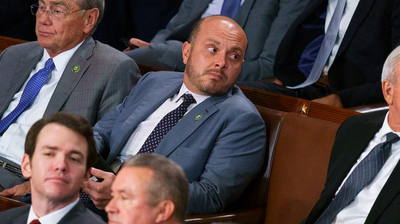
Rep. Andrew Garbarino (R-N.Y.) said during a Thursday morning event that labor shortages within the cyber sector present the biggest long-term threat to U.S. cybersecurity.
“Workforce — in five years, if we don't fix this workforce problem, that is probably the biggest threat that we have toward ensuring that when it comes to cybersecurity,” Garbarino said.
The GOP lawmaker spoke at a panel hosted by Punchbowl News, where he discussed the future of cybersecurity and artificial intelligence's (AI) place in it.
Garbarino stressed that the workforce shortage in the cyber sector, which, according to cybersecurity workforce analytics platform Cyber Seek, currently sits at more than 570,000 job openings, creates opportunities for “bad actors” such as China, Russia, Iran and North Korea to “attack” companies and the U.S. government.
It's not only the shortage of workers that concerns Garbarino, but the pressure building across sectors to hire highly skilled workers equipped to fight against ransomware and other attacks.
Garbarino began sharing these concerns about the ongoing labor crunch in June during a House Homeland Security Committee subpanel hearing.
“We need not only enough people, but the right people with the right skills in the right jobs to meet the growing cyber threat,” Garbarino said.
Former National Cyber Director Chris Inglis, who urged the government to hire more workers in cyber and tech during that same hearing, mentioned that the administration has “been successful in filling two-thirds of the jobs that have the word 'cyber' and ['information technology'] in it, and that’s the good news.” However, he said that there is still more that needs to be done.
For Garbarino, part of the solution is not only strengthening partnerships in the private and public sectors, but shrinking the information gap between the sectors about the rapid development of AI.
“It is a steep learning curve, even for me, because AI can touch so many different aspects — there’s a whole cybersecurity aspect when talking about AI,” Garbarino said.
The lawmaker also said that Congress could contribute to solving the workforce deficit by incentivizing schools, through additional funds, to adjust the curriculum that offer cyber-related classes.
“We can help give money to schools — I'm talking about K-12 — to change the curriculum, so people are starting to focus on cyber at a young age,” Garbarino said.